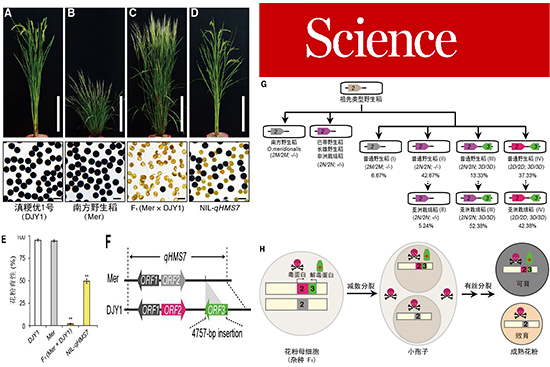A selfish genetic element confers non-Mendelian inheritance in rice
作 者:Xiaowen Yu1,*, Zhigang Zhao1,*, Xiaoming Zheng2, Jiawu Zhou3, Weiyi Kong1, Peiran Wang1, Wenting Bai1, Hai Zheng1, Huan Zhang1, Jing Li3, Jiafan Liu2, Qiming Wang1, Long Zhang1, Kai Liu1, Yang Yu1, Xiuping Guo2, Jiulin Wang2, Qibing Lin2, Fuqing Wu2, Yulong Ren2, Shanshan Zhu2, Xin Zhang2, Zhijun Cheng2, Cailin Lei2, Shijia Liu1, Xi Liu1, Yunlu Tian1, Ling Jiang1, Song Ge4, Chuanyin Wu2,†, Dayun Tao3,†, Haiyang Wang2,†, Jianmin Wan2,†
影响因子:41.058
刊物名称:Science
出版年份:08 Jun 2018
doi:10.1126/science.aar4279
文章摘要 :
Selfish genetic elements are pervasive in eukaryote genomes, but their role remains controversial. We show that qHMS7, a major quantitative genetic locus for hybrid male sterility between wild rice (Oryza meridionalis) and Asian cultivated rice (O. sativa), contains two tightly linked genes [Open Reading Frame 2 (ORF2) and ORF3]. ORF2 encodes a toxic genetic element that aborts pollen in a sporophytic manner, whereas ORF3 encodes an antidote that protects pollen in a gametophytic manner. Pollens lacking ORF3 are selectively eliminated, leading to segregation distortion in the progeny. Analysis of the genetic sequence suggests that ORF3 arose first, followed by gradual functionalization of ORF2. Furthermore, this toxin-antidote system may have promoted the differentiation and/or maintained the genome stability of wild and cultivated rice.
下载链接:http://science.sciencemag.org/content/360/6393/1130





